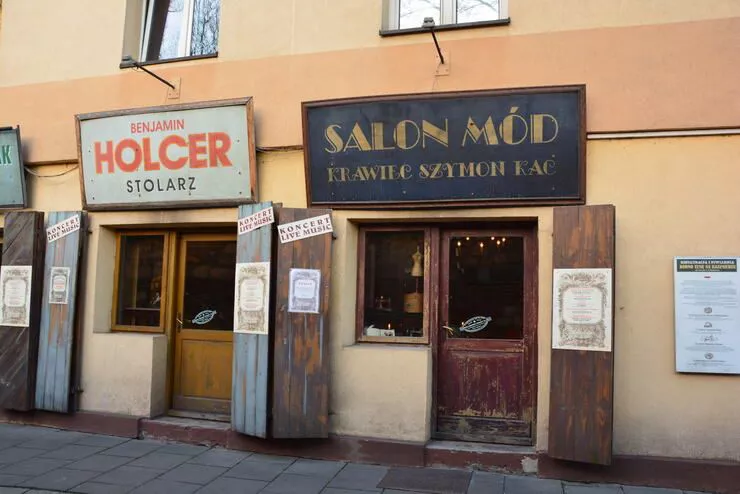





Jewish cuisine and where to find it.
For centuries, Kraków has been a meeting place of various cultures, naturally reflected in its cuisine and dietary habits. That’s why the Jewish cuisine is found within Polish just as influences from the Orient, the Holy Roman Empire, and Italy are.

The culinary heritage of Kazimierz and Kraków Jews evolved from a unique blend of factors: primarily the modesty of the (often empty) wallet, secondly, the religious principles dictating the consumption of kosher food, and thirdly, the availability of ingredients. Initially, these factors meant the cuisine wasn’t rich or sophisticated. Pork was categorically excluded, as was the combination of meat and dairy products, in adherence to religious laws. However, the rich flavours were largely influenced by Kraków being the capital of a prosperous kingdom with burgeoning international trade, lying at the crossroads of trade routes connecting east and west.
Gefilte fish, prepared from local carp found in the muddy waters of Małopolska, tastes distinctly better when seasoned with spices brought from the Orient. Cinnamon, another Oriental spice, is essential in enriching the flavour of tzimmes, a local deli primarily made from candied carrots. These same exotic spices, along with native onions and garlic, gave a unique taste to dishes popular thanks to their affordability, like herring and the grain and bean mixture known as cholent.
While today’s Jewish restaurant menus in Kraków and Kazimierz show Polish and Ukrainian influences and innovative creations of their chefs, traditional dishes can still be found in Kazimierz. Some have been enjoyed in Jewish homes in the area for centuries, some emerged in the 19th century, while others, like hummus, falafel, shakshuka, or oriental coffee, have been adopted from Israel only recently, yet have already managed to capture our hearts.
Local cultures always benefit from diversity, which has been the second name of Kazimierz. It is evident in the dozens of restaurants, bars, pubs, and (yes!) foodtrucks offering the highly welcome breather after a day’s worth of just being a tourist. The other, luckily less important side of the diversity coin is that it can be a problem for the tourists at a loss with their “Where to look for the dishes I’m going to love and want to taste most?”
The answer lies in preparation: browsing through dozens upon dozens of opinions on individual restaurants and bars available online at your fingertips, perhaps saving several articles about the local Jewish cuisine to read on board of your plane, and talking to people who have visited Kazimierz, and whom you meet during your stay. Perhaps it is a good idea to book a room in one of the local hotels, why not Klezmer Hois as it also runs its own restaurant with delicious Jewish cuisine and a bookshop in Mikveh: the former Jewish bath for women. It stands at the end of Szeroka street, where most of the places advertising themselves as “Jewish” and actually being Jewish, such as Ariel and Hamsa, are located.
A good idea can be to arrive here for the Jewish Culture Festival, this year held from 23 to 30 June, when Jewish (also gourmet) culture is especially well represented in the city, and the grand closing concert is held nowhere else but in Szeroka street, which fills with the dancing crowd of revellers. An interesting place closely connected to the festival is Cheder, a bar offering contemporary Middle Eastern, mostly Israeli, snacks ranging from poached eggs and hummus, via baba ganoush to roasted eggplants. Worth special attention are the drinks, ranging from such cocktails as Dybbuk to oriental teas and coffees, with the one and perhaps the only Red Espresso made of rooibos with foamed milk, honey and cinnamon.
Yet all these are only a handful of the tastes you can’t, and really shouldn’t, resist. Do come to Małopolska, Kraków, and Kazimierz!
Speaking of Jewish influences on the gourmet preferences in Kraków, you cannot overlook the bagel. It was first mentioned in print, as “bajgiel” in the documents of Kraków municipality in 1610. The word quite likely is of German origin, and means a round loaf of bread. Today, the bagel in its ring-shaped form is known everywhere from Kraków to New York.
Can there be anything out of the ordinary in the blend of chickpea paste, roasted ground sesame, olive oil, garlic, and lemon juice, that is hummus? Perhaps not elsewhere in the world, yet in Kraków, we add our beloved ingredients that others may find unexpected. While dried plums like Suska Sechlońska and wild garlic are quite imaginable extras in hummus, the inclusion of pickled cabbage from Charsznica is something special in more than one sense.








